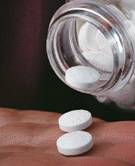Recommended for some patients aged 50 to 59 years; insufficient evidence for those <50, ≥70
TUESDAY, Sept. 15, 2015 (HealthDay News) — The U.S. Preventive Services Task Force (USPSTF) has concluded that the benefits and harms of low-dose aspirin for prevention of cardiovascular disease (CVD) and cancer vary by patient age. These findings form the basis of a draft recommendation statement published online Sept. 14 by the USPSTF.
Researchers from the USPSTF reviewed the evidence relating to use of low-dose aspirin to prevent CVD and cancer. They then prepared recommendations that address different age groups.
The researchers found that for adults aged 50 to 59 years who have a 10 percent or greater 10-year CVD risk and are not at increased risk for bleeding, low-dose aspirin should be taken to prevent CVD and colorectal cancer (Grade B recommendation). For individuals aged 60 to 69 years with a greater than 10 percent 10-year CVD risk, the decision to use low-dose aspirin should be an individual one (Grade C recommendation). For adults younger than 50 years and for those age 70 years and older, the current evidence was insufficient to weigh the balance of benefits and harms of aspirin use (Grade I statements). These findings form the basis of the draft recommendation statement, which will be available for comment until Oct. 12.
“Taking aspirin is easy, but deciding whether or not to take aspirin for prevention is complex,” task force vice chair Kirsten Bibbins-Domingo, Ph.D., M.D., said in a statement.
Draft Recommendation Statement
Draft Evidence Review 1
Draft Evidence Review 2
Draft Evidence Review 3
Copyright © 2015 HealthDay. All rights reserved.








